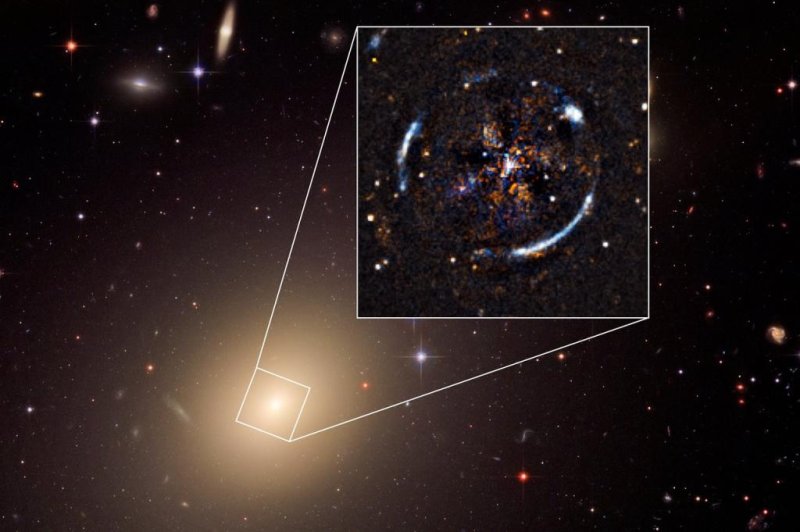Scientists precisely measured the gravitational lensing effect around an elliptical galaxy located 450 million light-years away. Photo by NASA/ESA/Hubble
June 21 (UPI) -- The theory of general relativity states that objects and their gravitational pull distort the spacetime around them. The phenomenon explains the gravitational lens effect, the bending of light in a lens-like shape around large galaxies and cosmic structures.
Recently, astronomers successfully measured the gravitation lensing effect around the elliptical galaxy ESO 325-G004, located 450 million light-years from Earth. The test proved with record-precision the general relativity.
Astronomers used the MUSE instrument on the Very Large Telescope to analyze the movement of stars within ESO 325-G004 to estimate the galaxy's mass. Astronomers than used high-definition images collected by the Hubble Space Telescope to measure the lensing ring around the galaxy. Their measurements revealed how light -- and thus, spacetime -- are being distorted by the galaxy's mass.
The amounts of distortion measured were similar to the amount predicted by the theory of general relativity.
"We know the mass of the foreground galaxy from MUSE and we measured the amount of gravitational lensing we see from Hubble," Thomas Collett, an astronomer at the University of Portsmouth, said in a news release. "We then compared these two ways to measure the strength of gravity -- and the result was just what general relativity predicts, with an uncertainty of only nine percent. This is the most precise test of general relativity outside the Milky Way to date. And this using just one galaxy!"
The gravitational effect of the supermassive black hole at the center of the Milky Way alters the light of distant stars. Scientists have measured this effect with high precision. Measuring gravity across larger cosmological scales is more difficult, but it is essential to confirming important cosmological models.
The latest findings, published in the journal Science, confirm the theory of relativity and undermine models that suggest gravity behaves differently across different cosmological scales.
"The universe is an amazing place providing such lenses which we can use as our laboratories," said Portsmouth researcher Bob Nichol. "It is so satisfying to use the best telescopes in the world to challenge Einstein, only to find out how right he was."















